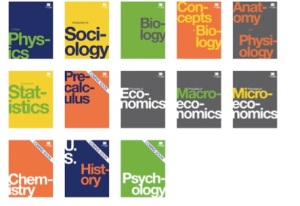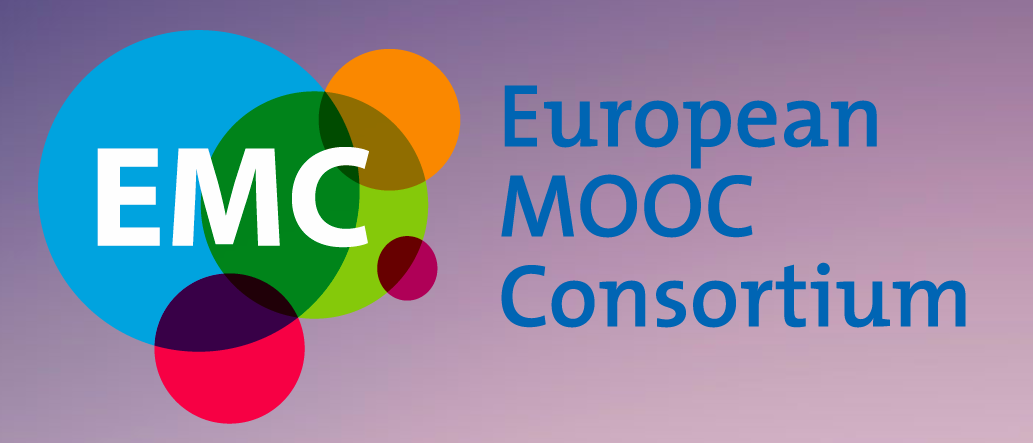Welcome to part two of the OpenStax College (OSC) student survey findings. In this post we look more closely at some of the findings relating to the use and impact of OSC open textbooks. You can check back to Part I for the background to these findings, an overview of the sample and the main research findings relating to OER behaviours and attitudes.
Please note that as commented on in Post I, these survey findings relate to both informal and formal students who told us they have used, or currently use, OSC open textbooks. As previously noted, further work needs to be done to better understand the results that follow.
OpenStax College Textbooks
Nearly 60% of survey respondents told us that OSC textbooks were required reading and that they did not purchase any other textbooks for the course (57.8%, n=26). 34.0% of respondents told us they were using OSC Biology within this context (n=16) with the next popular “required reading” response being OSC College Physics (12.8%, n=6). 17.8% of respondents told us OSC textbooks were recommended reading for the course they were participating in and they did not purchase any other textbooks for the course (n=8). The most used OSC textbook within this context was College Physics, with 12.8% of respondents reporting this textbook as recommended reading (n=6).
When we asked respondents what ways (if any) open educational resources (OER) had made an impact on their formal studies (although it is likely that students studying in an informal context also responded to this question) the top three responses to this question were as follows. “Using OER (e.g. OSC textbooks) has led to my…”
- Increased interest in the subjects taught (66.0%, n=31)
- Increased satisfaction with the learning experience (63.8%, n=30)
- Grades improving (46.8%, n=22)
Although this question refers to OER in general as well as OSC specifically, given the context of the questionnaire and filtering of responses, there is evidence for students feeling more satisfied and interested in their learning as a result of using OER generally and/or OSC specifically. Indeed, later on in the questionnaire, when asked whether they would recommend OSC textbooks to other students 100% of respondents responded in the affirmative (n=49).
Of note is that when we asked OSC using educators to agree/disagree with a series of similar questions (with a Likert Scale set of possible responses) 50.7% of educators told us they “strongly agreed” or “agreed” that using OER such as OSC in the classroom leads to improvements in students’ grades (11.0%, n=7 and 39.7%, n=29 respectively). Whilst comparative data of student test scores would be needed to verify the perceptions of both students and educators regarding this particular impact of using OER/OSC, there are similarities between educator and student perceptions of the types of impact OER/OSC have. Similarly nearly 55% of OSC using educators “strongly agreed” or “agreed” that OER such as OSC increases learners’ interest in the subjects taught (6.8%, n=5 and 47.3%, n=35 respectively) whilst 66.2% of respondents to the OSC educator questionnaire told us that they “strongly agreed” or “agreed” that OER/OSC increases learners’ satisfaction with the learning experience (14.9%, n=11 and 51.4%, n=38 respectively).
36.2% of respondents felt that their use of OER made it more likely they would complete their course of study (n=17). One high school student using the OSC biology textbook as recommended reading noted: “I went from being horrible in AP Biology to actually reading these and went from D 66% up to an A 90% so far.” Although later in the survey this student reported that they spend no money on textbooks (and therefore thought they had saved no money through the use of OSC) and it could be argued that the very fact they are using a textbook at all made a difference to their test scores, there appears to be something specific about OSC textbooks (the claim of “actually reading these” which perhaps reflects on the quality of the textbooks) which made a difference to this students’ learning.
Almost 40% of students felt they gained confidence through using OER such as OSC (38.3%, n=18) whilst just over 40% felt that they increased their independence and self-reliance through using OER/OSC (42.6%, n=20). Similarly 45% of respondents thought OER such as OSC increased their engagement with lesson content and/or increased their participation in classroom discussions (both 44.7%, n=21). It is worth stressing again that these results need further analysis: it is highly unlikely, for example, that someone studying in an informal context would tell us using OER/OSC had increased their participation in classroom discussions.
Textbook Costs and Savings
Using a question from the Florida Student Survey (with special thanks to Robin Donaldson for giving us permission to use) we asked students what percentage of their textbook costs were covered by financial aid for the Fall term of last year (when the survey was open). Bearing in mind that some of our respondents were studying in an informal context and therefore this question was probably inapplicable to their context, 10.2% of all respondents told us that all their textbook costs for that period were covered by financial aid (n=5) whilst 4.1% reported less than 25% was covered (n=2). 30.6% of respondents told us none of their textbook costs were covered by financial aid (n=15), whilst 55.1% of OSC using students reported not receiving financial aid (n=27). It is worth noting that more work needs to be done to understand the responses to this question: a small number of respondents noted in the “Further Comments” section that their institution provided them with textbooks and so no spend on textbooks was required. Interestingly, in two instances where people had noted similar detail two of these respondents had answered “All of my textbook costs” (possibly interpreting the institution providing textbooks as some kind of “financial aid”) whilst another had answered “none”.
We also asked respondents whether they received any form of financial aid for study but further work is needed to understand how the responses relate to financial aid relating to textbooks (10.2% of respondents answered “Yes” n=5, 85.7% “No” n=42 and 4.1% “Don’t Know” n=2). However, in either instance, it appears that this survey only had a small number of respondents who are eligible/in receipt of financial aid.
A conservative estimate of respondent financial savings (through asking how much money had been saved by using OSC textbooks) calculates an average saving of $208 per student (n=24). It is worth noting that reported amounts saved ranged from $5 to $650.
Nearly 80% of respondents thought they had saved money by using OSC textbooks (79.6%, n=39). However, as above, this finding may need unpacking further due to some students not needing to buy textbooks (and therefore their institution benefiting from any financial savings made). In this instance the difference between types of student (e.g. informal or/and formal) does not apply. However, more work would be needed to understand types of responses to the previous question, particularly as almost 60% of respondents reported that they thought their institution benefits financially by using OSC textbooks (57.8%, n=26).
Impact on Studies
To give a sense of the range of responses we received when asking students about any impact using OSC textbooks had on their studies, here is a selection of feedback, covering some recurrent themes (accessibility, financial savings and study experience):
“Open Stax textbooks offer me peace of mind and permit me to study in a more relaxed way. I am grateful not to have to come up with hundreds of dollars per class for books.” (Student studying without a teacher)
“Saved my back, I already have so many other books in my backpack and using my computer for more info saved additional stress that would have been on my back.” (College student)
“Made learning easier and more accessible, helped and broadened my understanding and learning, made me WANT to study, helped me become interested in Biology because of the easy layout and presentation.” (High School Student)
“Since I cannot afford textbooks, they are an invaluable tool.” (Informal learner)
Throughout the questionnaire we also received other comments regarding the use of OSC textbooks and/or comments on the resources. For example:
“We have the PDF version downloaded on our computers and our reading assignments are from Open Stax. My teacher also references Open Stax for studying purposes and further explanation on tough class topics. I have really enjoyed using Open Stax, it is easy to find information and very easy to understand. I like the pictures and detail. I only wish we had a print our version because it is hard to look at the PDF version on my phone on the go.” (US High School Student)
“Not only is it easy to navigate but very helpful!! Only thing I would change would be to make the file easier to download, I had some technical difficulties!” (US High School Student)
“I use it, to prepare for tests learn more about any unit we have covered, for it is very detailed in the subject matter its very well written and very clear to read.” (US High School Student)
Thanks to everyone who participated in the student survey and look out for future posts once further analysis has been conducted!





Leave A Comment